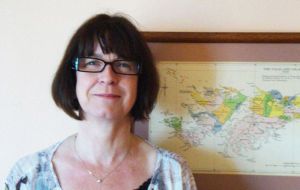MercoPress. South Atlantic News Agency
Falklands' record Illex and Loligo seasons, despite lack of data sharing with Argentina
 Because of Argentina’s lack of cooperation to share data “we don’t know how many fish are in the water” of the whole region, said Dr Arkhipkin.
Because of Argentina’s lack of cooperation to share data “we don’t know how many fish are in the water” of the whole region, said Dr Arkhipkin.  Chair of Falkland Islands Fishing Companies Association Cheryl Roberts said the report was very helpful
Chair of Falkland Islands Fishing Companies Association Cheryl Roberts said the report was very helpful  Over 500 jiggers visited Berkeley Sound this season and 20 Korean jiggers are still fishing in our zones.
Over 500 jiggers visited Berkeley Sound this season and 20 Korean jiggers are still fishing in our zones. A lack of cooperation from Argentina to share data means that the total Illex fishery for the region is not known and affects the accuracy of seasonal predictions in the Falklands fishery, it was reported at the Fisheries Committee on Thursday.
Senior Fisheries Scientist Dr Sasha Arkhipkin presented the scientific program for the Fisheries Department for 2015-2017 outlining research and studies to be undertaken in that period and said that because of Argentina’s lack of cooperation to share data “we don’t know how many fish are in the water” of the whole region.
This affects accuracy of forecasts and stock predictions for the Illex fishery, “but there are other ways to predict data” he said.
The Falklands have enjoyed a very good season despite the lack of regional cooperation. In the Loligo fishery, more than 28,000 tons were taken by the end of the first season, making it the third highest Loligo catch after 2010 and 2012, and an absolute record of 300,000 tons in the Illex fishery was hit by June 10.
Over 500 jiggers visited Berkeley Sound this season and 20 Korean jiggers are still fishing in our zones.
It has been a big year for transhipping as a result of such successful squid catches, and a record number of fees have been collected, Director of Natural Resources John Barton told the committee.
One of the most successful areas elsewhere in the fishery has been the two year study on mesh size of nets to address by-catch, “our most serious problem” said Dr Arkhipkin.
Rock cod by-catch was a particular concern in the past and the fishery has recovered since.
Fishery of rock cod is down this year, “but that in part is down to demand from the industry” said Mr. Barton.
The by-catch of small skates is a serious problem as they are discarded by vessels, he told the committee, and further explained that though the fishery is steady the catch is not of consistent quality.
“Creating a Marine Protected Area like we did for Toothfish and whiting may be worthwhile,” said Dr Arkhipkin. Studies into the biology, trends, maturity and size of stock, not just the quantity, of different fisheries is scheduled to take place over the next few years.
Statistics showing the observer deployments to vessels in the Loligo fishery was also presented to the committee that showed an annual coverage of the fishery of more nine per cent.
Chair of Falkland Islands Fishing Companies Association Cheryl Roberts said the report was very helpful, although personally she would like to see more observers on vessels.
It was agreed that this kind of report should be produced annually to assist the industry.
Mr. Barton said he thought the number of observer boarding was “fair” given the difficulties in weather conditions and logistics but discussion evolved in the committee to address how the process could be made easier, including the possibility of requesting ships to dock at FIPASS to tranship observers.
At the moment an observer is required by Customs to only land at a registered port said Mr. Barton.
With each observer costing around £35,000 annually “to move from six to seven observers to fifteen or so would potentially be a big problem for the budget” he told the committee. (Penguin News).-




Top Comments
Disclaimer & comment rules-

-

Read all commentsLooks like the Falklands and Argentina are both setting records at the moment.
Jun 23rd, 2014 - 09:13 pm 0So either Argentina doesn't know how much is being caught off their coast, or they do not want to admit that they are overfishing. Hmmm, incompetence or irresponsibility? Seems lately Argentina has been trying to set records in both.
Jun 25th, 2014 - 02:17 am 0Commenting for this story is now closed.
If you have a Facebook account, become a fan and comment on our Facebook Page!